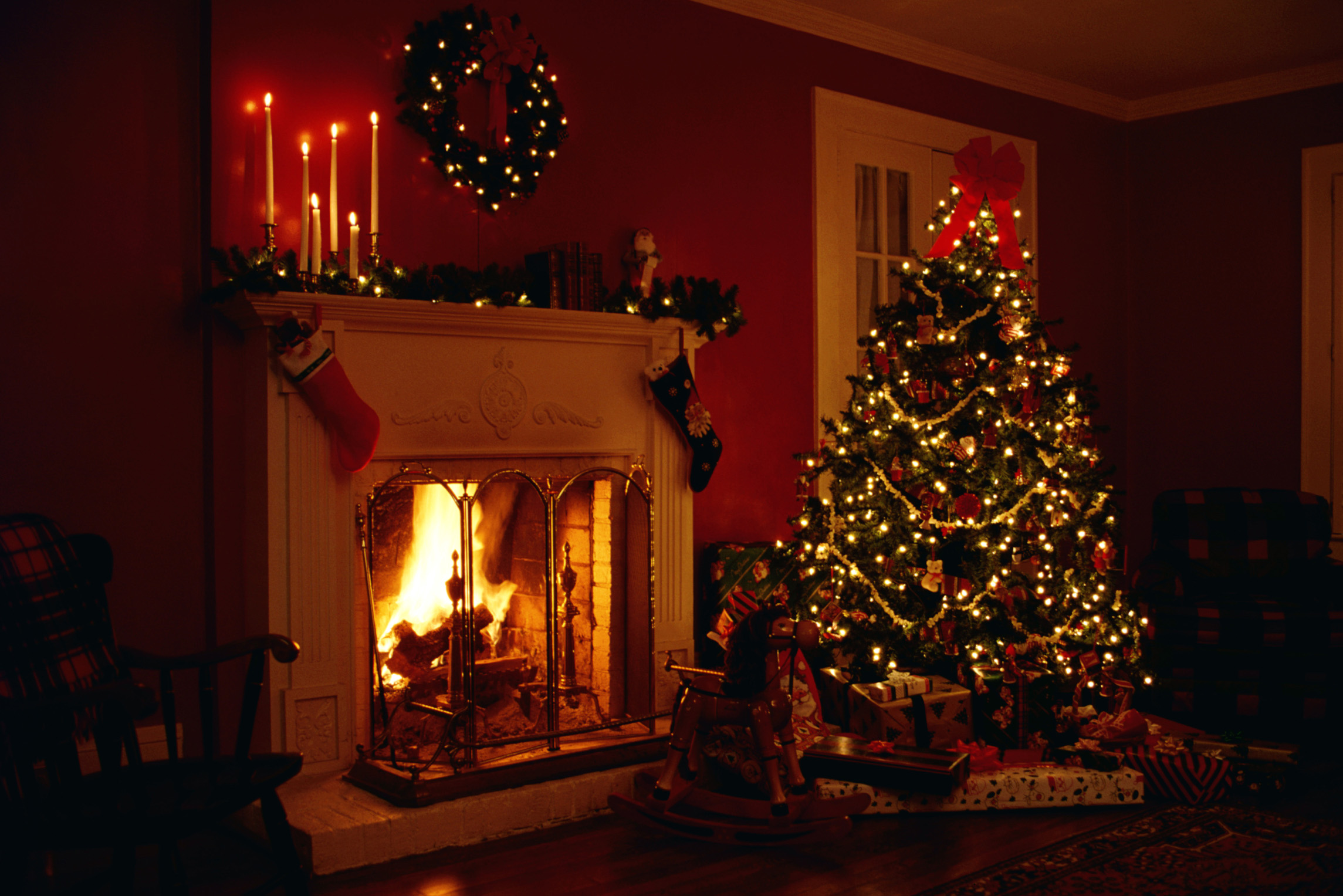If you’re wondering whether to cut down a real tree this year or go buy a plastic reusable one, you’re not alone.
Great Christmas tree debate: real vs. plastic
In fact, that’s one of the most Googled questions this holiday.
Gregory Keoleian, a professor with the University of Michigan’s School for Environment and Sustainability, suggests either buying a tree you can later plant outdoors, or giving your business to a Christmas tree farm.
“I do get a natural tree because it’s very dry and we need to add humidity to our house … and I do appreciate the tree aesthetic,” said Keoleian, also co-founder and director of the Center for Sustainable Systems.
Keoleian buys his trees from a tree farm.
Christmas tree farms typically use marginal agricultural land, he says, and the trees provide environmental benefits as they grow. New trees are constantly planted. In addition, the Christmas tree farms provide a livelihood for farmers.
But don’t just go into the forest and cut down a tree. Those trees could grow to be 50 to 100 years old if left alone, and they’re helping the planet by sequestering carbon.
So: Christmas tree farm = good. Chopping down tree in a forest = bad.
As for plastic trees, if you already have one, use it!
Artificial trees are usually made from PVC, so they are not recyclable and must be sent to a landfill. But after using it about five years, the environmental footprint is lessened.
If you want to get rid of your plastic tree, offer it up free on Craigslist or Facebook Marketplace before dooming it to the landfill.
When you’re done with your natural tree for the year, make sure to compost it. Most neighborhoods have easy options … unless your tree is flocked.
To flock or not to flock?
That is the question. And the answer: ‘Tis nobler to refrain.
While there’s some debate about how environmentally problematic flocking actually is, most composting companies won’t take a flocked tree with artificial snow.
So check first if you don’t want your tree heading to the landfill.
Other kinds of ‘trees’
Los Angeles-based author Vanessa McGrady opted for a different kind of tree in her home this year. Behold: The Book Tree!
“I’ve never felt super okay about killing a tree (and spending all that money) just for a couple of weeks’ worth of decoration at the holidays,” explains McGrady.
“2019 was the year of the book for us, because I had a book published and my daughter suddenly became this voracious book nerd, so a book tree seemed like a good choice. I had to redo it a couple of times before it looked okay!”
Lighting the tree
Keoleian says one of the best things you can do for the environment is check the lights on your tree.
“The older big bulb (C9) incandescent tree lights are very inefficient and should be replaced with LED’s. It’s easy to identify them because they got hot quickly and can even pose a fire risk.”
Using LED lights can save you 90% on your electricity bill.
Keoleian also recommends putting your lights on a timer to save additional electricity (and to keep things friendly with the neighbors who might be annoyed by your 24-hour Clark Griswold display).
Looking for more ideas?
Keoleian’s department at the University of Michigan produced its own video this year with ideas for more sustainable Christmas decorating.
Beautiful (and compostable!) gift wrapping
“Wrapping paper that is metallic, has glitter or is laminated is not recyclable” says Keoleian.
If you’re as sad about this glitter thing as I am: Hark! The Herald Design Bloggers are here to rescue you.
Whitney Leigh Morris of the Tiny Canal Cottage showcases some of the truly beautiful gifts she’s “wrapped” this season on her blog.
She covers her presents with book jackets, tea towels, upcycled and resewn old garments, and cotton muslin cloth bags to wrap up her presents.
Sometimes she adds a repurposed ribbon and she almost always hunts around for some natural ornamentation: “We adorn any gift we’re giving with greenery clipped from the garden or from around the neighborhood.”
Sustainable gift ideas
“When it comes to gifting, we’re trying as hard as possible to do locally made goods in sustainable packaging. Because it’s not just the present itself that has a carbon footprint, it’s the packaging as well. The more you can cut back on the distance the gift has to travel, the better,” says Morris.
The grapevine in the backyard of Morris’ tiny cottage provides fruit that her neighbors then turn into jam.
At Christmas, all her friends get mason jars full of the stuff.
“So we’re gifting homemade jam that was grown right here in the city. There’s no waste involved. That’s a great joy because people love a handmade gift.”
And if it’s not homemade, Morris tries to make sure it’s still environmentally friendly.
“For other items we’re gifting, we’re trying to select low-waste home goods and hygiene products that we know people are interested in, but have yet to try. For example, there are toothpaste tablets now available in refillable glass jars, and those are great because one billion toothpaste tubes are thrown out each year.”
Morris also likes to give shampoo bars as gifts.
Blogger Erin Boyle of Reading My Tea Leaves focuses on gifts that don’t take up a lot of space in her Brooklyn Heights apartment.
“I always say for me the two best boxes to tick are ‘useful’ — something you can use in your home and ‘something that goes away.’ There’s just not that much room for stuff.”
The Buy Nothing Project
“I’m part of the Buy Nothing Project,” says Boyle.
“It’s these groups on Facebook, it’s been so encouraging. So many people are exchanging lights, people are giving away [their] extra ornaments.”
Boyle says that sharing what you don’t need — and getting the stuff that you do want secondhand — is a great way to see “how the merriment can exist without buying anything new.”
An old-fashioned Christmas
Boyle doesn’t have anywhere to plant a live a Christmas tree, so she also buys from a Christmas tree farm every year.
She keeps her ornaments simple and old-fashioned. She makes cinnamon and applesauce ornaments with her kids and she strings popcorn and cranberries for garlands.
She has also dried fruit in the oven and then hung it on the tree. The oranges take on an almost “stained glass” look at night, with light shining behind them. In fact, it all looks so tasty, her young daughter couldn’t resist taking a bite out of one of the dried pears on the tree. (She pronounced it delicious.)
Boyle decorates her tree with beeswax candles … but fear not: “We’re not actually lighting candles in our fourth floor Brooklyn Heights apartment. It’s just for the aesthetic, and it goes with the old-fashioned idea.”
When it’s cold enough, she spreads more Christmas cheer by making ice ornaments with her kids and stringing them up outside her apartment building and around her neighborhood. The contents of her ornaments are all-natural so when they melt, there’s no waste. She also makes ice lanterns. Both of these projects are great to do with kids over the holidays.
But what if your aesthetic is more Kardashian than “Little House on the Prairie”?
If you want a blingier tree, then try to find vintage glass ornaments. If you didn’t inherit any, you can often find them in thrift stores.
Morris suggests looking through your jewelry box and decorating with the bijoux you already have. Anything can be an ornament: Even those kids’ toys you’re tripping over.
Buy less and buy quality
The goal, says Morris, is to buy less plastic and reuse what you have.
And when you do buy something, spend a little more for good quality.
Those plastic tree stands I seem to buy every few years? Not good. Find a sturdy one and stick with it.
‘Need, read, want and wear’
Author Vanessa McGrady offers another suggestion for parents struggling to control the amount of stuff their kids are getting.
“We’re also adapting something our friends are doing and calling it ‘need, read, want and wear.’ So one thing she needs, one thing she’ll read, one thing she wants and one thing she’ll wear to cut down on the scope of spending.”
Back at the University of Michigan, the Good Professor shouted these Christmas suggestions with glee:
Dr. Keoleian’s Holiday Gift Ideas:
- Give a set of LED holiday lights and LED replacements for lamps/recessed cans
- Encourage train travel by giving out Amtrak gift cards
- Buy carbon offsets for a friend
- Give a set of reusable containers for packing lunches and storing leftovers to reduce food and packaging waste
- Return gifts you don’t really need and donate the money to your favorite charity
- If you’re fit, shovel your neighbor’s driveway so they don’t have to run their snow blower and you don’t have to drive to the gym
And from all of us here at CNN:
May your days be merry and clean, and may all your Christmases be green!







